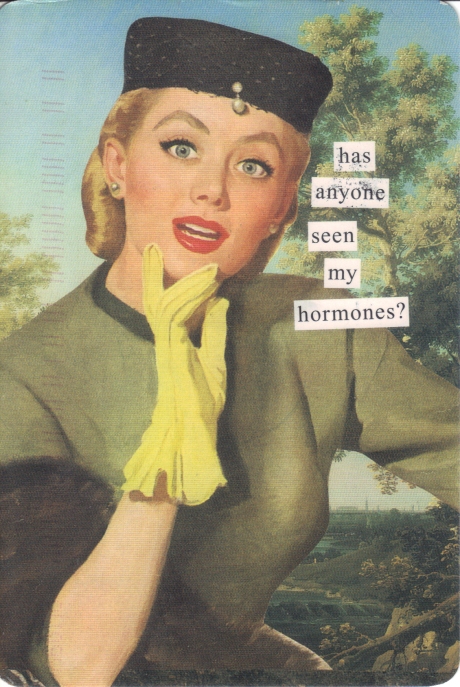The Hormones of Labour and Birth
05/02/2010
 “An intricate and exquisitely balanced combination of hormones is necessary to trigger all the functions of labour and birth. The subtle, complex interplay of changing hormone levels during the birth process is one of the most fascinating and little understood aspects of pregnancy and birth in the modern world” Ina May’s Guide to Childbirth
“An intricate and exquisitely balanced combination of hormones is necessary to trigger all the functions of labour and birth. The subtle, complex interplay of changing hormone levels during the birth process is one of the most fascinating and little understood aspects of pregnancy and birth in the modern world” Ina May’s Guide to Childbirth
The hormones that the female body produces in labour are simply amazing. Prostaglandins, oxytocin, beta-endorphins, adrenalin, noradrenaline and prolactin all working wonders within the bodies of mothers and babies, bringing them into the world and giving each the best possible start.
The purpose of this post is to discuss how fear in the mind of the labouring woman has a knock on effect on this hormonal interplay and can inhibit the birth process. The two hormones being examined in this case are oxytocin and adrenalin.
Oxytocin, the Love Hormone
Every moment in your life when you felt good, for example; when you had dinner with friends, got married, were hugged or kissed, were made love to and or (!) had an orgasm, there was a hormone that was making it so. The hormone you should thank for all these wonderful experiences is oxytocin.
Maybe you would not associate being in labour with any of the feel good events mentioned above, and yet it is this hormone of love that is optimally coursing through us when we are in labour. It’s importance during and after birth cannot be underestimated. In labour, oxytocin causes the uterus to contract and in turn the cervix to dilate. When a mother pushes her baby out, oxytocin levels are the highest they will ever be in a woman’s lifetime. This is important for two reasons. Firstly, the mother and baby (whose oxytocin levels have also peaked) lock eyes for the first time and fall deeply in love. This stimulates the let down reflex in the woman’s breasts to facilitate breastfeeding. Secondly, the oxytocin will keep the uterus contracting so that the placenta comes out. Oxytocin at this stage in labour greatly reduces the risk of postpartum haemorrhage. Oxytocin is the essential ingredient in the recipe of birth.
Adrenalin the Fear Hormone
When we are afraid, the hormone released is adrenalin. This triggers the “Fight or Flight” response in us. In a nutshell, what happens is large amounts of blood rush away from our organs and go straight to our limbs so we can either run for our lives or stay and fight whatever is scaring the hell out of us.
In the first stage of labour, Adrenalin impedes oxytocin for this very reason. The uterus requires a huge amount of oxygenated blood to function optimally. When the fear sets in and our adrenal glands open, this takes the blood away from where it is most needed. This interference makes contractions much more painful and it s-l-o-w-s e-v-e-r-y-t-h-i-n-g- d-o-w-n. To quote Ina May once more; “If Oxytocin is the accelerator of birth, then adrenalin is the brakes”
From an evolutionary perspective this made sense. Imagine the cave woman in labour and along comes a sabre tooth to eat her. Adrenalin rushes through her body, hindering oxytocin and stopping labour so she can run for her life. An evolutionary response that has ensured our survival on the planet.
In a modern-day setting, it is very common for a woman to be progressing beautifully through the first stage of labour, secure in her home environment, only to arrive at hospital to have everything slow or come to a stand still as a result of feeling uneasy in the unfamiliar surroundings. We may live in a very different world to our ancestors but our primitive instincts remain unchanged.
Remove the Fear
“Our doubts are traitors and make us lose the good we oft might win, by fearing to attempt”
William Shakespeare
When a woman faces every contraction and new sensation in her body with fear, adrenalin will upset the hormonal balance, making the first stage of labour longer and more painful. In a hospital setting this can result in a cascade of interventions that will alter the experience of birth. However, when a woman prepares herself mentally and replaces fear with curiosity and tension with excitement, she will develop trust and confidence in her innate abilities This will set the scene so these hormones can play out as they were meant to, rewarding the woman with the most powerful natural high of her life and giving her and her baby the best possible beginning.
Recommended reading and links
Read Dr Sarah Buckley’s fantastic explanation of the birthing hormones and their individual roles here